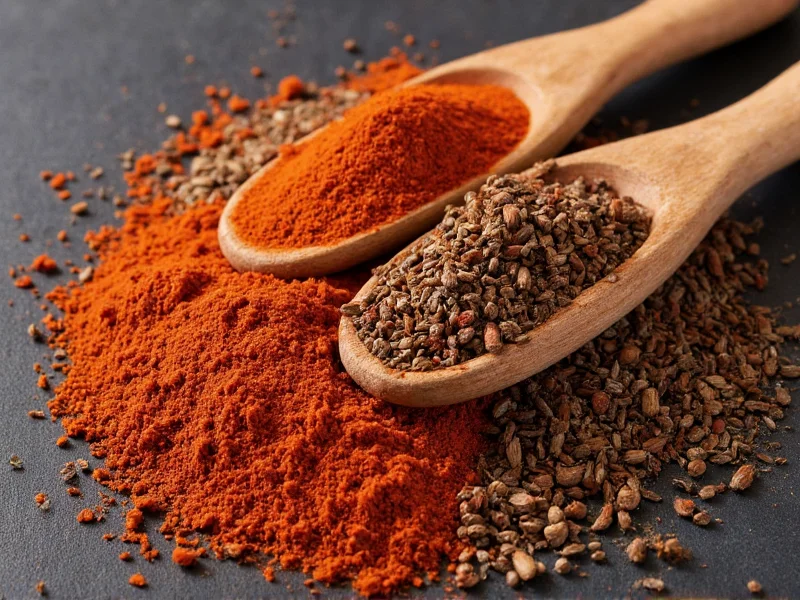Greek cuisine's distinctive flavor profile comes from a carefully curated selection of herbs and spices that have been used since ancient times. Unlike many spice-heavy cuisines, Greek cooking emphasizes quality over quantity, with each spice serving a specific purpose in enhancing the natural flavors of fresh ingredients. The Mediterranean climate provides ideal growing conditions for many native herbs, resulting in intensely flavored varieties that differ from their counterparts grown elsewhere.
Essential Greek Spices and Herbs
The backbone of Greek seasoning consists of several key ingredients that appear in countless traditional recipes. Understanding these core elements is crucial for authentic Greek cooking.
| Spice/Herb | Traditional Greek Name | Primary Uses | Distinguishing Characteristics |
|---|---|---|---|
| Greek Oregano | Dórkos | Tomato sauces, grilled meats, salads | Stronger, less sweet than Mediterranean oregano with earthy notes |
| Mint | Dhiosmos | Tzatziki, lamb dishes, vegetable salads | Crisp, refreshing flavor more intense than common mint varieties |
| Dill | Anápios | Fish dishes, yogurt sauces, cucumber salads | Sweeter, more delicate than North American dill |
| Cinnamon | Kinámon | Stews, rice dishes, desserts | Primarily Ceylon cinnamon with subtle citrus notes |
| Allspice | Síkipatro | Meatballs, stews, braises | Known as "Syrian pepper" in Greece, essential for "yemista" |
The Significance of Wild Mountain Oregano
When discussing what are Greek spices, wild mountain oregano (Origanum vulgare subsp. hirtum) deserves special attention. This variety grows abundantly on Greek hillsides and contains higher concentrations of essential oils than cultivated oregano. The piney, slightly bitter notes of authentic Greek oregano transform simple tomato sauces and grilled meats into distinctly Greek dishes. Many chefs insist on using only Greek oregano for moussaka, pastitsio, and other baked dishes where its robust flavor can shine.
The harvesting process significantly impacts quality—wild oregano picked before flowering contains the highest concentration of aromatic compounds. Traditional Greek cooks often crush dried oregano between their palms before use to release maximum flavor, a technique that enhances the herb's natural oils.
Regional Spice Variations Across Greece
Greek spice usage varies significantly by region, reflecting historical trade routes and local agricultural conditions. Understanding these regional differences provides deeper insight into what are Greek spices in authentic context:
- Mainland Greece: Features heavier use of paprika and black pepper in meat dishes, particularly in northern regions influenced by Balkan cuisine
- Island Cuisine: Emphasizes lemon and fresh herbs with lighter spice applications, reflecting the abundance of citrus and coastal ingredients
- Cretan Cooking: Incorporates unique wild herbs like dittany (diktamo) for medicinal and culinary purposes
- Aegean Islands: Features distinctive use of mastic gum from Chios, creating a pine-like flavor in desserts and savory dishes
The "northern spice mix" (vasilopita spice blend) used in Macedonia and Thrace combines cinnamon, allspice, and cloves in proportions different from southern Greek cooking. This regional variation demonstrates how Greek spices adapt to local preferences while maintaining culinary identity.
Traditional Greek Spice Blends
While Greek cooking typically uses individual spices rather than pre-mixed blends, several traditional combinations have become signature elements of Greek flavor profiles:
"Yogurt Spice Mix" for tzatziki combines dried mint, garlic, and a pinch of dried dill. The quality of mint makes a significant difference in this simple but essential condiment. Authentic Greek cooks often use fresh mint when available but rely on high-quality dried mint during winter months.
"Souvlaki Spice" varies by region but typically includes oregano, thyme, marjoram, garlic powder, and a touch of allspice. The balance of these elements creates the characteristic flavor of Greek street food. Many family recipes guard their specific proportions as culinary heirlooms.
"Sweet Spice Mix" for Greek desserts combines cinnamon, cloves, and mastic gum in precise ratios. This blend appears in baklava, galaktoboureko, and other traditional sweets, with regional variations affecting the dominant flavor note.
Historical Context of Greek Spices
The use of spices in Greek cooking dates back to ancient times, with archaeological evidence showing oregano and mint in Minoan settlements. Ancient Greeks used herbs both culinarily and medicinally, with Hippocrates documenting over 400 medicinal plants. The Byzantine Empire expanded spice access through trade routes, introducing cinnamon and cloves to Greek kitchens.
During Ottoman rule, Greek cuisine absorbed elements of Turkish cooking, incorporating allspice and enhancing the use of cinnamon in savory dishes. However, Greek cooks maintained their preference for fresh herbs over complex spice mixes, creating a distinctive culinary identity that persists today.
Modern Greek cooking has returned to emphasizing local, wild-harvested herbs, with renewed interest in traditional varieties that had nearly disappeared during the 20th century. This revival has brought renewed attention to what are Greek spices in their most authentic forms.
Practical Tips for Using Greek Spices
Authentic Greek cooking requires understanding how to properly use these spices:
- Add dried herbs early in cooking to allow flavors to develop, but add fresh herbs near the end to preserve their delicate flavors
- Toast whole spices like cumin seeds before grinding for maximum flavor release
- Store dried herbs in airtight containers away from light and heat to maintain potency
- Use Greek oregano sparingly—it's significantly stronger than other varieties
- Combine lemon juice with dried mint to reconstitute some fresh flavor in winter dishes
When exploring what are Greek spices in practice, remember that restraint is key. Greek cuisine celebrates the natural flavors of ingredients, with spices serving as enhancers rather than dominant elements. The best Greek dishes achieve balance where no single spice overpowers the others.











 浙公网安备
33010002000092号
浙公网安备
33010002000092号 浙B2-20120091-4
浙B2-20120091-4